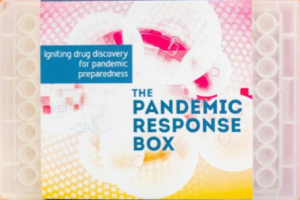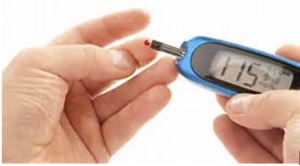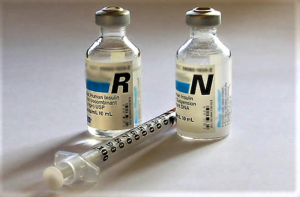- MMV and DNDi create a response box to foster R&D for pandemic diseases (pharmaceutical-technology.com)
Medicines for Malaria Venture has collaborated with the Drugs for Neglected Disease initiative to create a pandemic response box, which contains 400 structurally diverse antibacterial, antiviral and antifungal compounds to help accelerate the discovery and development of new treatments of pandemic diseases...The response boxes are available free of charge to global researchers from universities and pharmaceutical companies. In return, researchers are expected to publicly share results from research and development based on the compounds within two years of obtaining a box...MMV chief scientific officer Dr Timothy Wells said: The pandemic response box came about in response to the need to be prepared for a future global health emergency...Open innovation is one of the keys to unlocking new potential for drug discovery and tapping into existing expertise to kickstart new research efforts...
- This Week in Managed Care: January 25, 2019 (ajmc.com)
Laura Joszt, Managing Editor at The American Journal of Managed Care. Welcome to This Week in Managed Care from the Managed Markets News Network
- European and UK pharma industry call for action as parliament rejects Brexit deal (pharmaceutical-technology.com)
The European and UK pharma industry have called for preparations to ensure that patients will have access to their medications in case of a no-deal Brexit by 30 March 2019...The call follows parliament’s rejection of Prime Minister Theresa May’s Brexit withdrawal plan...the European Federation of Pharmaceutical Industries and Associations highlighted ‘real, tangible and immediate threats’ to patients and public health in the UK as well as the EU...“Now is the time for policy makers in the UK and the EU to put politics aside and put measures in place to prevent patients being harmed by the consequences of Brexit...“In particular from disruption to the supply of medicines including from transport delays at the border and where the development, manufacture, packaging, safety testing and regulation of the medicine no longer benefits from mutual recognition.”
- January 18 Pharmacy Week in Review: Influenza Data Finds More Than 6 Million People Sick This Season, and Walmart Ends a Partnership With CVS (pharmacytimes.com)
Nicole Grassano, PTNN, Pharmacy Week in Review, this weekly video program provides our readers with an in-depth review of the latest news, product approvals, FDA rulings and more.
- EMA moves its headquarters from London (pharmaceutical-technology.com)EMA lays cornerstones for new Amsterdam headquarters (fiercebiotech.com)
The European Medicines Agency has begun its relocation from its headquarters in London to the organisation’s new location in Amsterdam, the Netherlands...In early January, Dutch authorities handed over a temporary building for EMA staff...the staff relocation into will be finalised on 30 March 2019...It is hoped that the move to a temporary location in time for the UK’s planned departure from the EU in March 2019 will allow the agency to remain operational during the relocation...The relocation is because the EMA must have its HQ in a European member state, meaning after the UK voted to leave the EU in 2016, the EMA had to choose a new location...
- Swiss team develop ‘microswimmer’ robot to deliver drugs through the body (reuters.com)
A tiny sliver of elastic material swims along inside a narrow tube, coiling up and changing shape in response to the thickness of fluid and the contours of the tube around it as it moves towards its goal...The miniature robot - the bacteria-inspired brainchild of a team of scientists in Switzerland seeking new methods to deliver drugs to diseased tissue - is designed to wend its way through blood vessels and other systems in the body...The tiny soft microswimmer robot they have developed is a few millimeters in length and made using a folding technique similar to the Japanese art of origami, helping it adapt to the environment around it...
- State receives first reports on diabetes drug costs; questions remain over what will be publicly disclosed (thenevadaindependent.com)
Nearly 20 drug manufacturers and pharmacy benefit managers submitted reports to the state detailing the costs of manufacturing and distributing diabetes drugs in advance of a Tuesday deadline, and state officials continue to comb through others received this week as they prepare to undertake their first examination of the factors contributing to the costs of treating Nevadans with diabetes...drug companies and PBMs...,insurers and pharmacies — were required to submit reports to the state explaining the costs associated with essential diabetes drugs and, for some, why the costs of those drugs increased significantly over the prior year...The new law additionally requires the state to compile an annual report analyzing the information it receives from drug companies and PBMs in aggregate to explain the factors contributing to the costs of treating diabetes...
- More than two dozen companies required to submit reports on diabetes drug costs have not complied (thenevadaindependent.com)
Nearly 40 drug companies and pharmacy benefit managers submitted reports to the state detailing the costs associated with manufacturing and selling essential diabetes drugs by this month’s deadline, though almost as many have yet to report...27 drug companies identified as manufacturers of essential diabetes drugs have yet to report to the state. Scott Jones, manager of the Primary Care and Health Workforce Development Office, said in an email that the state will be reaching out to those companies to inform them of the law and obtain the required reports. (If they refuse, the state is allowed by law to impose a fine of $5,000 a day.)...
- Computerized method helps better protect pharma patents (news-medical.net)
Routes to making life-saving medications and other pharmaceutical compounds are among the most carefully protected trade secrets in global industry. Building on recent work programming computers to identify synthetic pathways leading to pharmaceutically complex molecules, researchers in Poland and South Korea have unveiled computerized methods to suggest only synthetic strategies that bypass patent-protected aspects of essential drugs...When we started this project, I was somewhat skeptical that the machine would find any viable synthetic alternatives--after all, these are blockbuster drugs worth gazillions of dollars, and I was sure that the respective companies had covered the patent space so densely that no loopholes remained. It turns out that the loopholes are there, and we can find new retrosynthetic pathways that circumvent the patents entirely."( Bartosz Grzybowski )...the researchers hope that their software will aid pharmaceutical companies in better protecting their intellectual property and, simultaneously, will help accelerate research and development in organic chemistry by supplying synthetic routes that differ from standard approaches.
- This Week in Managed Care: January 18, 2019 (ajmc.com)
Laura Joszt, Managing Editor at The American Journal of Managed Care. Welcome to This Week in Managed Care from the Managed Markets News Network










